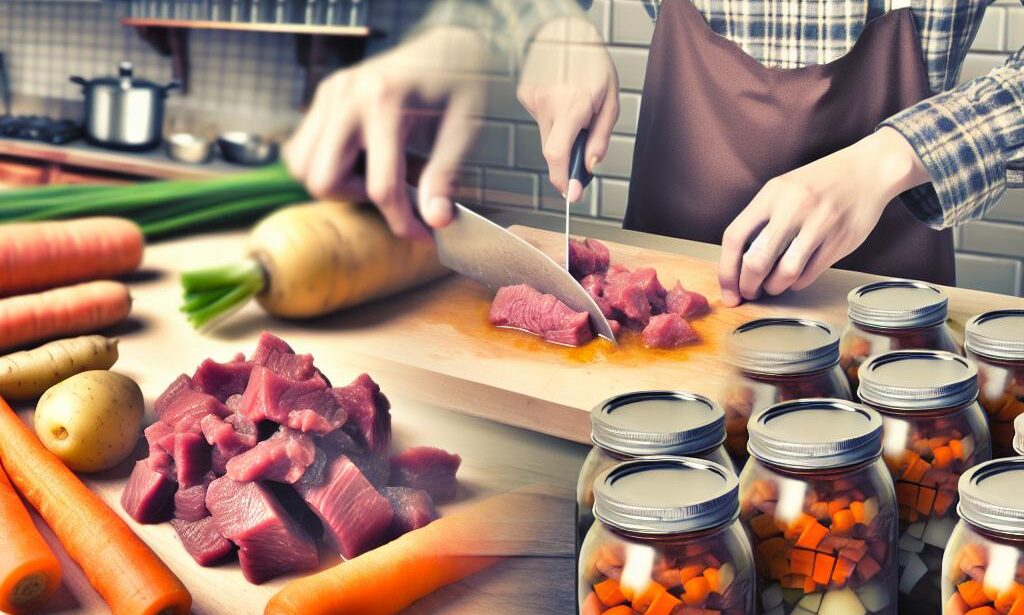Preserving Beef Stew: Mastering Meat Canning
Canning beef stew is a great way to ensure that you have a delicious and hearty meal ready to enjoy at a moment’s notice. By properly preserving your beef stew, you can extend its shelf life and maintain its quality for months to come. In this article, we will explore the ins and outs of mastering meat canning, from selecting the best ingredients to following proper canning techniques. Whether you are a seasoned canner or a beginner looking to expand your culinary skills, mastering the art of preserving beef stew is a valuable skill to have in your kitchen repertoire.
Table of Contents
- Introduction to Meat Canning
- Benefits of Preserving Beef Stew
- Best Practices for Canning Beef Stew
- Choosing the Right Equipment
- Safety Tips for Meat Canning
- Q&A
- Key Takeaways
Introduction to Meat Canning
Are you looking to extend the shelf life of your favorite beef stew recipe? Meat canning might just be the solution you’ve been searching for. By mastering the art of meat canning, you can preserve your delicious beef stew for months to come, ensuring that you always have a hearty meal on hand.
When it comes to meat canning, there are a few key things to keep in mind. First and foremost, it’s important to properly prepare your beef stew before canning. This includes cooking the stew thoroughly, allowing it to cool, and ensuring that all ingredients are fresh and high quality. Additionally, it’s crucial to follow proper canning techniques to ensure that your beef stew is safely preserved.

Benefits of Preserving Beef Stew
Preserving beef stew is a great way to enjoy your favorite comfort food all year round. By mastering the art of meat canning, you can ensure that your beef stew stays fresh and delicious for months to come. Here are some :
- Convenience: Having canned beef stew on hand means you always have a quick and easy meal ready to go. Simply heat it up and enjoy!
- Long shelf life: Canned beef stew can last for up to a year or more, making it a great option for stocking your pantry.
- Cost-effective: By preserving beef stew at home, you can save money on store-bought canned goods and reduce food waste.
| Benefit | Description |
| Convenience | Quick and easy meal option |
| Long shelf life | Lasts up to a year or more |
| Cost-effective | Saves money and reduces food waste |

Best Practices for Canning Beef Stew
When it comes to preserving beef stew through canning, there are several best practices to keep in mind to ensure the safety and quality of your canned goods. Follow these tips to master the art of meat canning:
- Use high-quality ingredients: Start with fresh, high-quality beef and vegetables to ensure the best flavor and texture in your canned beef stew.
- Properly prepare and cook the stew: Cook the beef stew thoroughly before canning to ensure that all ingredients are fully cooked and safe for long-term storage.
- Follow canning guidelines: Always follow the recommended canning guidelines and processing times for meat products to prevent the growth of harmful bacteria.
By following these best practices, you can confidently preserve your beef stew through canning and enjoy delicious, homemade meals for months to come.

Choosing the Right Equipment
When it comes to preserving beef stew through meat canning, is crucial for ensuring the safety and quality of your canned goods. Here are some key pieces of equipment to consider:
- Pressure Canner: A pressure canner is essential for safely canning meat, as it is able to reach the high temperatures necessary to kill harmful bacteria like botulism. Make sure to choose a pressure canner that is large enough to hold your jars and has a reliable pressure gauge.
- Canning Jars: Use high-quality glass canning jars specifically designed for canning meat. Mason jars are a popular choice, but make sure they are in good condition with no cracks or chips.
- Canning Rack: A canning rack is used to hold the jars in place during the canning process, preventing them from touching the bottom of the canner and ensuring even heat distribution.
By investing in the right equipment and following proper canning procedures, you can master the art of meat canning and enjoy delicious beef stew all year round.

Safety Tips for Meat Canning
When it comes to preserving beef stew through meat canning, it is important to follow proper safety tips to ensure the quality and safety of the canned product. Here are some key tips to keep in mind:
- Use a Pressure Canner: When canning meat, it is essential to use a pressure canner rather than a water bath canner. This is because meat is a low-acid food and requires the high temperatures that a pressure canner can provide to kill harmful bacteria.
- Follow Recommended Processing Times: Make sure to follow the recommended processing times for canning meat as outlined by reputable sources such as the USDA. This will ensure that the meat is properly cooked and safe to eat.
- Inspect Jars for Damage: Before canning meat, always inspect the jars for any cracks or chips. Using damaged jars can lead to seal failure and potential contamination of the meat.
| Meat Canning Safety Tips |
|---|
| Use a Pressure Canner |
| Follow Recommended Processing Times |
| Inspect Jars for Damage |
Q&A
Q: What is meat canning and why is it important for preserving beef stew?
A: Meat canning is the process of preserving meat by sealing it in a can or jar and heating it to destroy bacteria and other microorganisms. It is important for preserving beef stew because it extends the shelf life of the stew and allows it to be stored for long periods of time without refrigeration.
Q: What are the benefits of canning beef stew?
A: Canning beef stew allows you to enjoy the convenience of having a ready-to-eat meal on hand at all times. It also helps to reduce food waste by preserving leftovers or excess stew for later consumption.
Q: What are the steps involved in canning beef stew?
A: The steps involved in canning beef stew include preparing the stew, filling the jars with the stew, sealing the jars, and processing them in a pressure canner. It is important to follow proper canning procedures to ensure the safety and quality of the preserved stew.
Q: How long can canned beef stew be stored?
A: Canned beef stew can be stored for up to one year in a cool, dark place. It is important to check the seals on the jars regularly to ensure that they are still intact and the stew is safe to consume.
Q: Are there any safety precautions to keep in mind when canning beef stew?
A: When canning beef stew, it is important to use proper canning equipment, follow recommended recipes and processing times, and ensure that the jars are sealed correctly. It is also important to inspect the jars for any signs of spoilage before consuming the stew.
Key Takeaways
In conclusion, mastering the art of meat canning is a valuable skill that allows you to preserve beef stew for long-term storage. By following proper canning techniques and guidelines, you can ensure the safety and quality of your canned beef stew. Remember to always use high-quality ingredients, follow recommended processing times, and store your canned goods in a cool, dark place. With practice and attention to detail, you can enjoy delicious beef stew year-round. Happy canning!

